Specialized Aethos Comp review
Specialized delivers on its promise of sublime ride quality but with such an ordinary set of wheels, is the Comp overpriced?
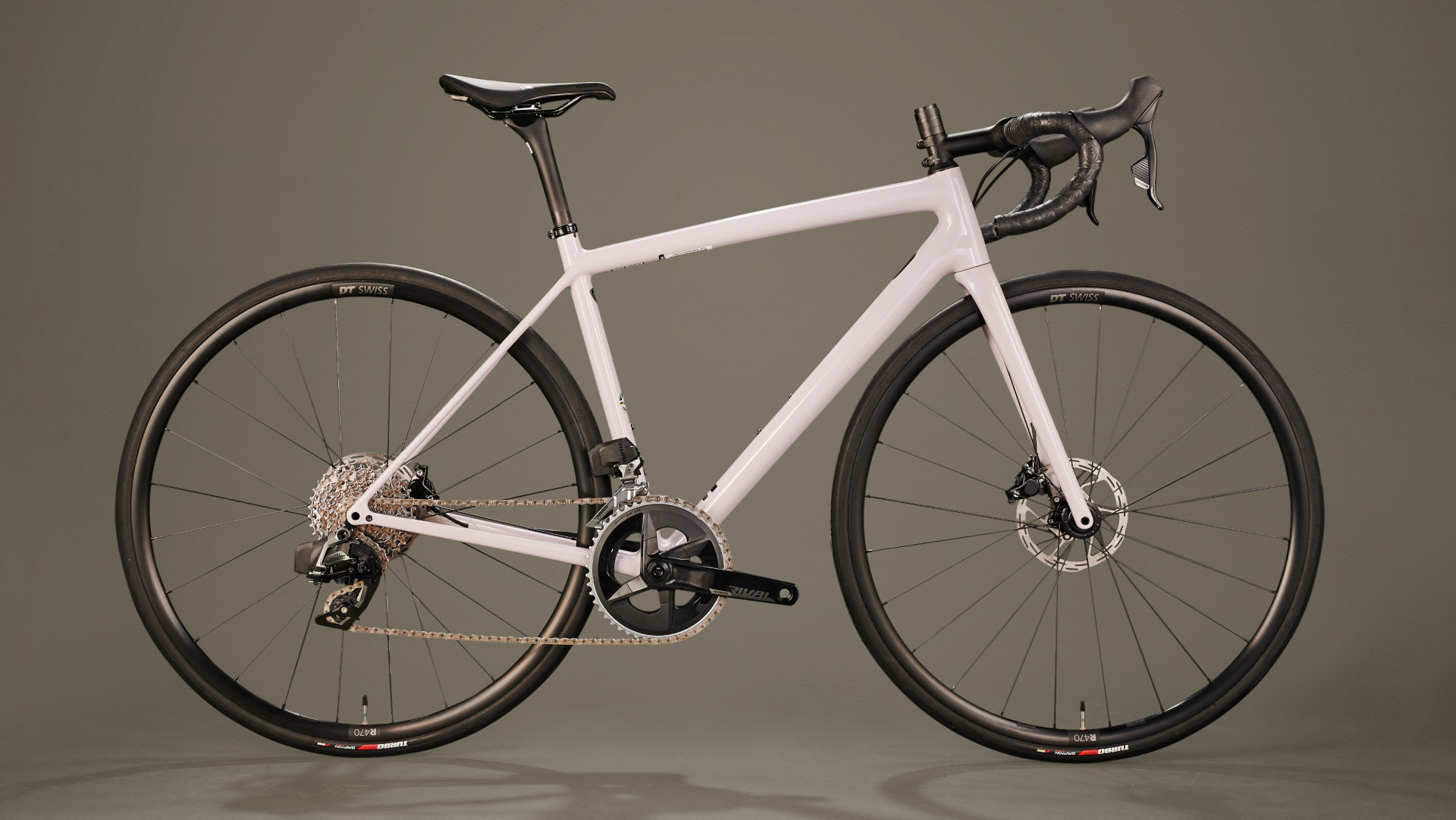
The Aethos Comp is not a ‘superbike’ like its S-Works relative but rather just a super bike. It doesn’t carry an eye-watering price tag but still shares an exquisitely designed frameset which is equipped with, for the most part, sensible components - including the top-notch Rival AXS groupset. It's a road bike that can pretty much do it all. Its agility and responsiveness make it bags of fun yet it’s comfortable enough for long days in the saddle or for days when you just want to take it easy. The wheels are unfortunately the proverbial anchor around the neck of the Aethos Comp, adding to the bike’s overall weight and doing their level best to dull the ride. They also leave you with a feeling that, despite the brilliance of the frame and groupset (both of which would score full marks as standalone products), the bike is somewhat overpriced. But cut loose the dead weight and you have a bike that will put a smile on your face every time you ride it. And that, perhaps, is something that’s hard to put a price on.
-
+
Beautifully designed sub 700g frameset
-
+
Balanced ride quality for racing and riding
-
+
Low maintenance threaded BB
-
+
Regular two-piece cockpit
-
-
Wheelset does not suit the £5k price tag
-
-
26mm tyres a little narrow
-
-
Weight of 7.86kg doesn't fit the featherweight reputation
You can trust Cycling Weekly.
Specialized’s Aethos launched as a high-end performance road bike that eschews aero styling in place of improved ride quality. It made waves for its ridiculously low weight and classic looks that flew in the face of current trends. The initial S-Works build featured the lightest ever production frameset at just 585 grams and an exorbitant price tag of £12,000 (now £12,600 / $13,500).
Since then Specialized have looked to broaden the bike’s appeal. It released the Aethos in a number of builds and used a different grade of carbon to help lower the price while still maintaining the spirit and performance of the original. The Aethos Comp is the entry level model; entry level, however, is very much a relative term when the RRP is £5,000 / $5,200.
Specialized Aethos Comp - the build
The Aethos Comp frameset is made from Specialized’s Fact 10r carbon compared to the 12r used on the S-Works model. In essence it’s just a cheaper grade of material that Specialized says affects the weight but not stiffness or ride quality. However, it still makes for a lightweight chassis that tips the scales at 699 grams (claimed, 56cm). That’s only 104 grams heavier than the S-Works frame, which costs £7,000 more when built.
Thankfully, the aesthetics remain unchanged. Out the box, the Aethos Comp’s looks are just as appealing as its more expensive brethren. It cuts a figure that’s quite the departure from many of today’s top-tier road bikes. There’s no aero tubing here. Nor is there an integrated stem or an oversized bottom bracket.
Instead the Aethos is refined in its appearance. There are no sharp edges, no dropped stays, nothing in fact that screams ‘race me’. It’s a bike that doesn’t look like it would cut through air but rather float across it.
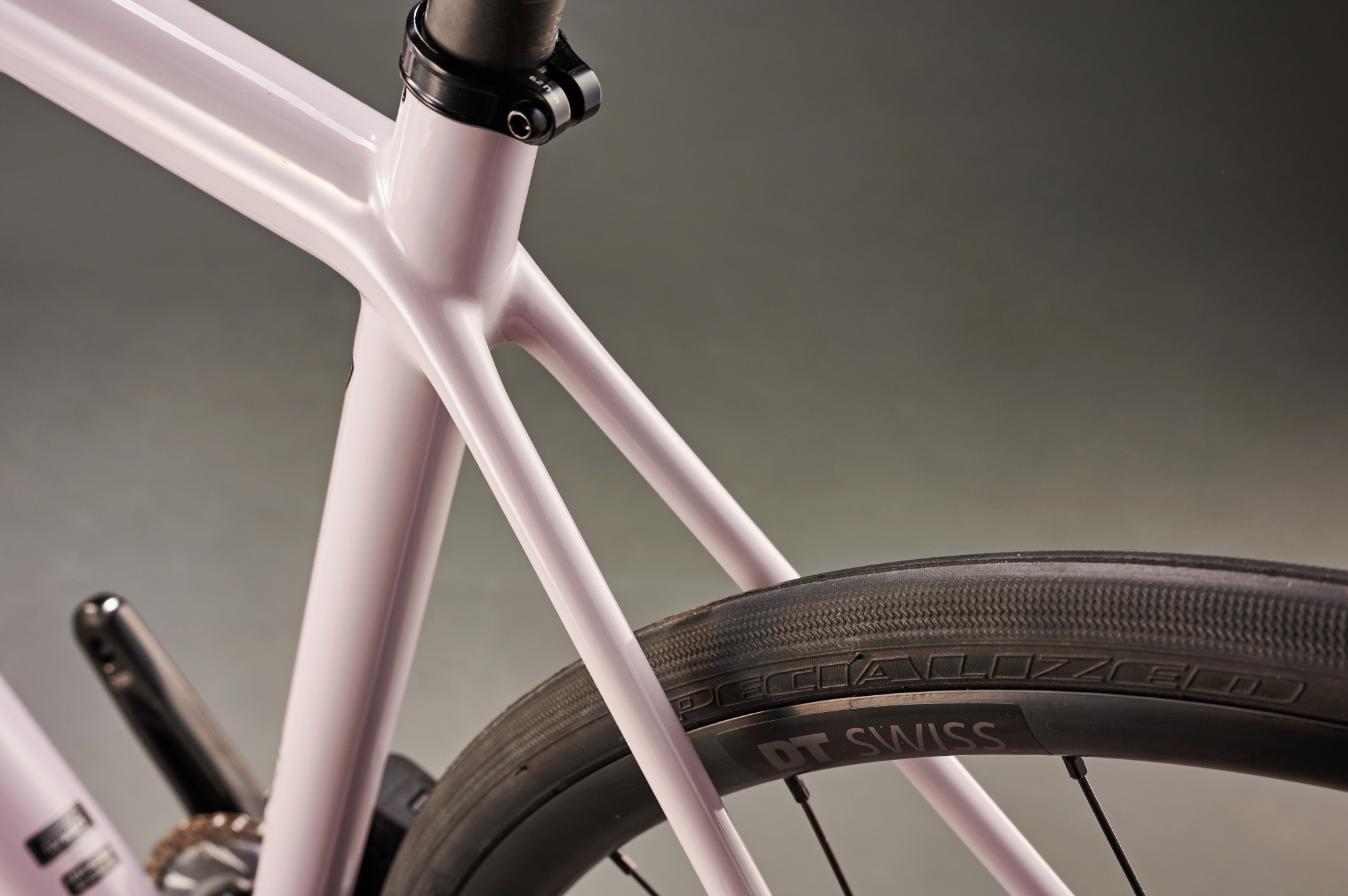
What you have is tapered round tubes and a round 27.2mm seatpost, held in place by a traditional collar. The bottom bracket is threaded. The bars and stem are non-proprietary; a good ol’ two piece cockpit that you can change around with ease. This also means external cables. Whether this matters to you depends on your preferences and probably whether you like to do your own maintenance or not. It’s certainly music to my ears.
The focus away from aero performance has instead been fixed on finding a blend of stiffness, low weight and compliance, none of which stop a bike from being quick and agile. In fact, a comparison of geometry charts shows that the Aethos shares numbers with the race-ready Tarmac SL7. Our 54cm model has a reach of 384mm and a stack of 544mm as does an SL7 of the same size. Both have a head tube angle of 73 degrees and chainstays that measure 410mm. Essentially this means a bike that’s pretty long and low, with a compact wheelbase (978mm) that should in theory make it very nimble indeed.
A key difference between the two frames, Specialized claim, is to be found in the compliance. To create the Aethos it stopped chasing wins, and started chasing the elusive "ride quality." A key element of ride quality is comfort, something that many aero race bikes have had to forgo in place of pure speed.
Looking at the Aethos and it’s fairly clear where some of this compliance should come from. There’s a noticeably sloping top tube, which means that there’s plenty of exposed seatpost - in this case it’s a featherweight Alpinist post that’s also used on the S-Works build. It’s a combination that usually does a stellar job of absorbing road chatter.
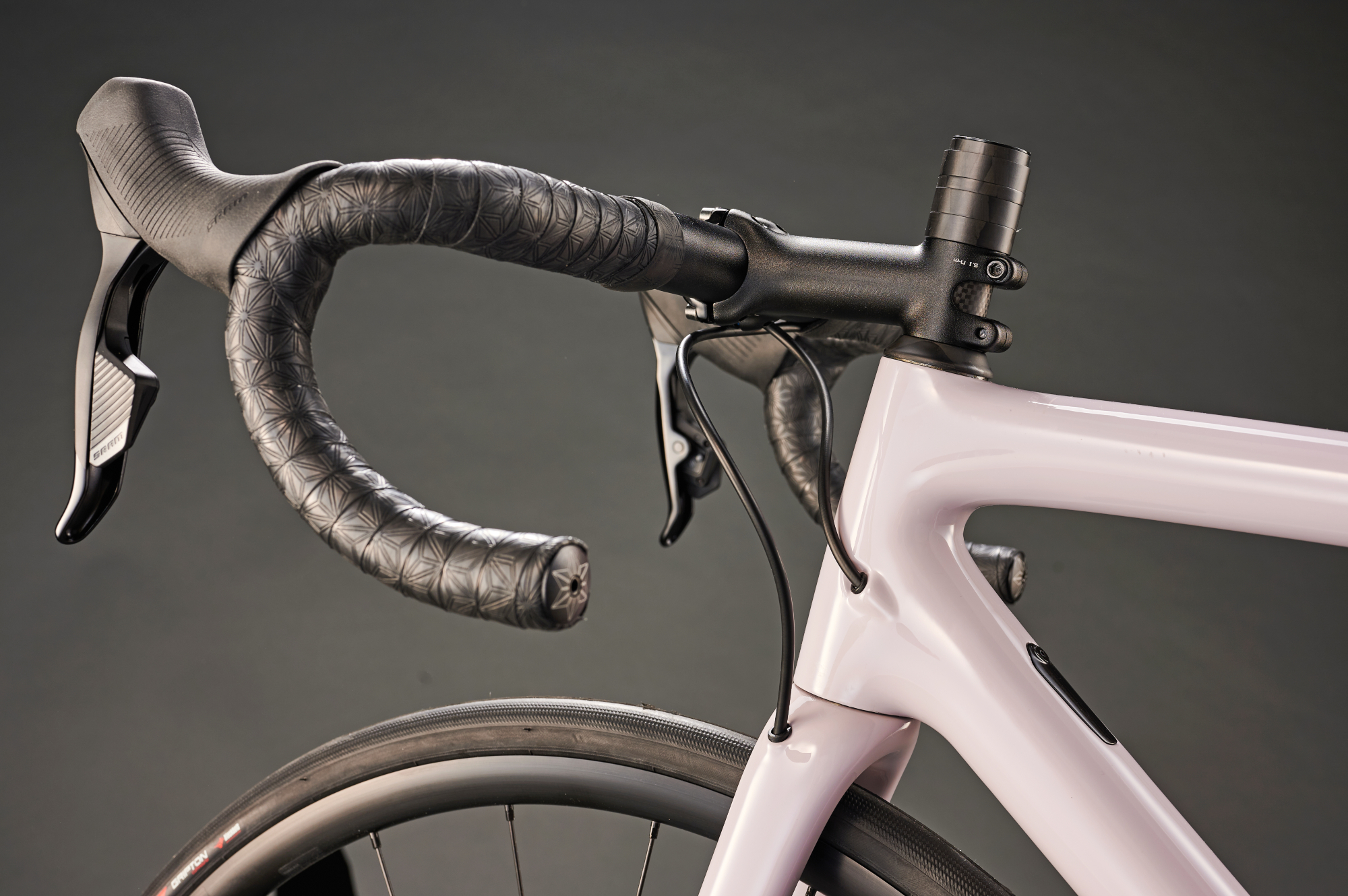
The frameset is paired with SRAM’s Rival eTap AXS groupset. Rival AXS is not a lightweight groupset, but aside from that, it seems like a good match. The 48/35t chainset and the 10-36t cassette make sense for a bike that’s positioned as a non-race machine that will deliver comfort on all-day rides.
The Specialized bars and stem are pretty straightforward. Made from lightweight forged alloy they’re designed to meet the needs of a wide group of riders as possible, with a traditional shape and mid-to-shallow drop.
So too the saddle. Here it’s Specialized’s Body Geometry Power Sport model featuring chromoly rails, short nose and relief channel. Nothing to get excited about but equally something that should work well for many people if it's not immediately replaced for a favoured perch.
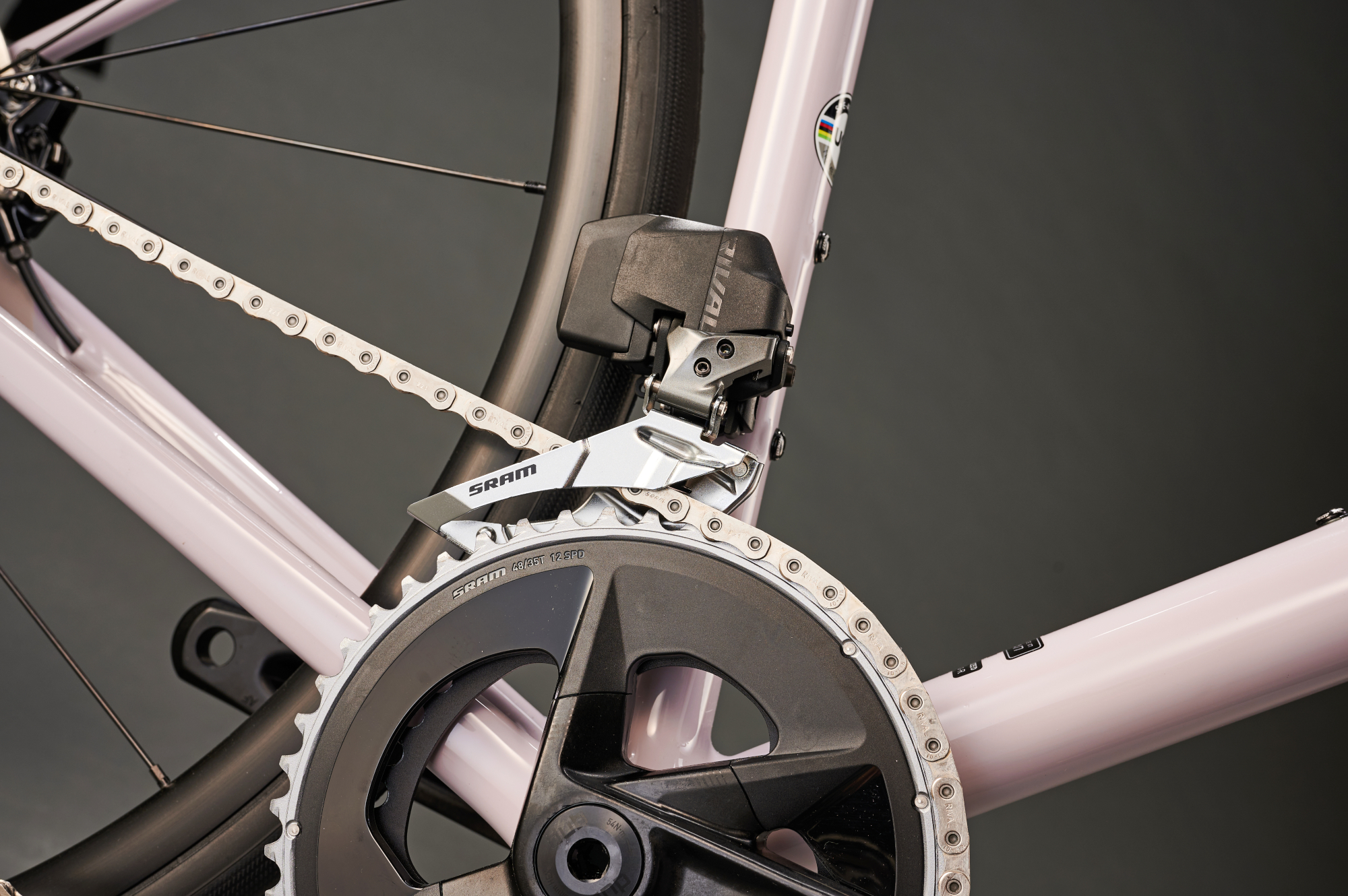
The same can’t be said for the wheels however. That a bike focussed on ride quality comes with a set of generic hubs laced to DT Swiss R470 rims is a genuine head scratcher. While it’s acceptable that compromises will have to be made on complete bikes at the cheaper end of the scale, I can’t help but feel that if you spend £5,000 you shouldn’t have to be thinking about an immediate upgrade.
The wheels are tubeless compatible and come with brass nipples to help fend off corrosion. But equally they are quite heavy, a little out of true, and feature hubs that offer pretty slow engagement. The hubs will probably be a pain to service or find replacement parts for too, at odds with the ease-of-maintenance theme that runs throughout the rest of the bike. They also contribute more than their fair share to the bike’s overall weight of 7.8kg.
The decision to fit the wheels with 26mm tyres also seems an odd choice, especially when the Aethos can handle 32mm. That said the Specialized Turbo Pro rubber is decent. I would just have preferred to see more of it in aid of greater comfort on the dilapidated lanes that I spend much of my time riding on these days.
Specialized Aethos Comp - the ride
It’s fair to say that I came to the Aethos Comp with lofty expectations. The marketing spiel had been consumed and had left me suitably intrigued. On arrival the bike’s elegance only heightened the anticipation ahead of the first ride. I wasn’t the only one who liked the cut of its jib.
Before it left the house, visitors had commented on the bike’s looks. Visitors, I might add, who wouldn’t normally comment on a bike propped up in my hallway. It’s amazing the responses you can elicit, in a world full of the brash and the bright, from simply not sticking a logo on something that surely must have one. Less has always been more. It’s just sometimes we need reminding.
Of course, bikes are to be ridden and looks aren’t everything. Except when it comes to the Aethos, these looks and the feelings they generate are mirrored in the ride. With remarkable clarity.
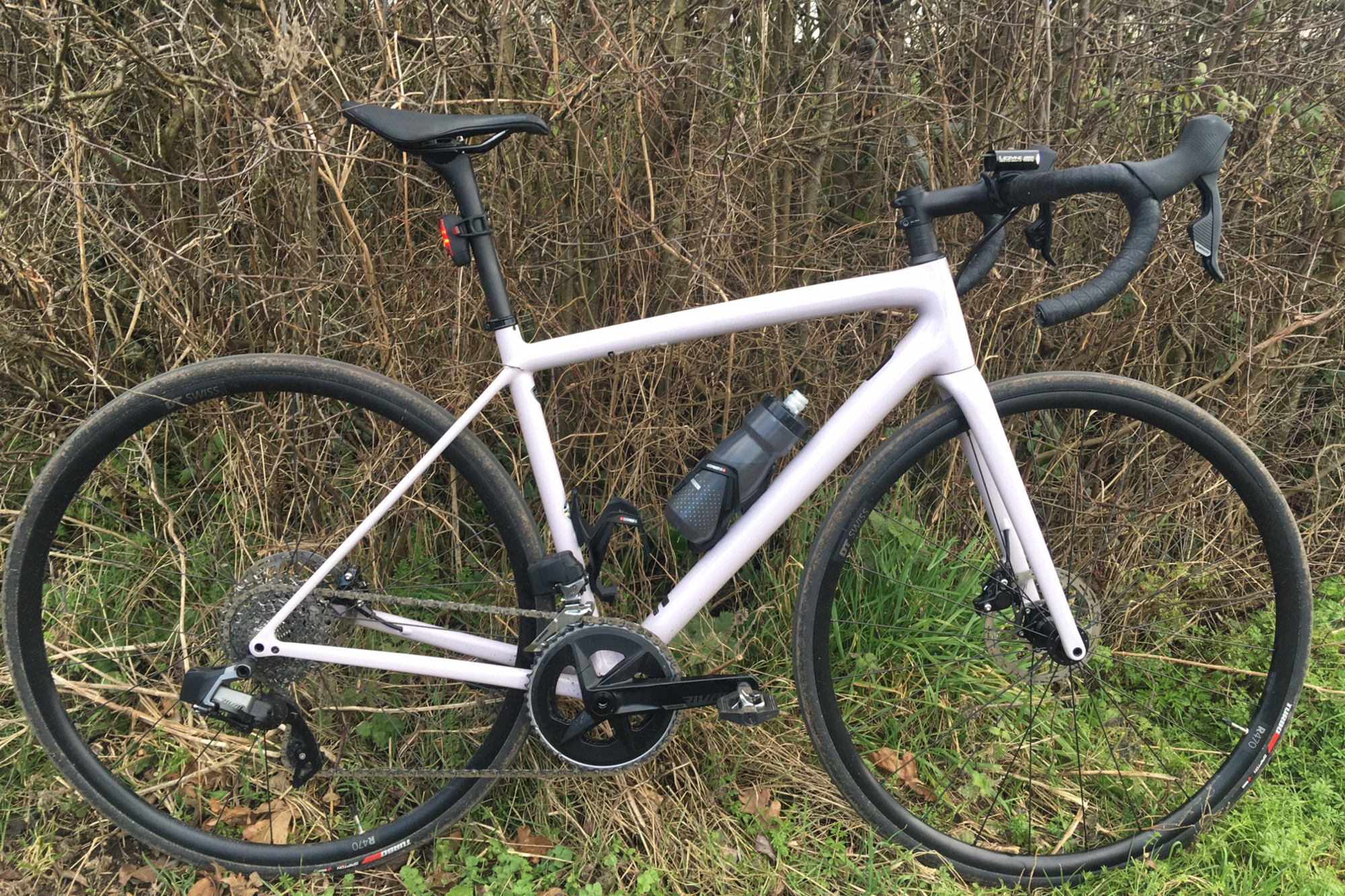
With the Aethos, Specialized have placed great emphasis not on making you faster or improving ‘your numbers’ but instead on enhancing ‘the ride’. If this may seem esoteric, it’s not. It’s about a blend of elements that make riding a bike on the road fun; feelings we can all appreciate no matter our riding credentials, like comfort and handling. Compare this with a frameset that’s been solely created to save me watts I never had at speeds I rarely reach, and it's quite a contrast both in concept but more importantly out on the road.
Take comfort. The Aethos has levels of compliance you might expect from an endurance bike but without any dulling of the senses. I still received feedback from the road when I needed it but wasn’t left feeling rattled by harsher road surfaces. Comfy yet connected is something we can all enjoy.
This doesn’t mean that the Aethos isn’t fast. It really is, just not in a bone-jarring way. Remember it’s geometrical similarities with the Tarmac? Well, it handles as you might expect a bike that has these numbers would do. It’s really agile and like many lighter road bikes it feels like it wants to accelerate at all times. The light, snappy front end combines brilliantly with that tight wheelbase to allow you to change lines in an instant. It’s a bike you can flick around if you so wish but also, importantly, one that still feels assured in its handling.
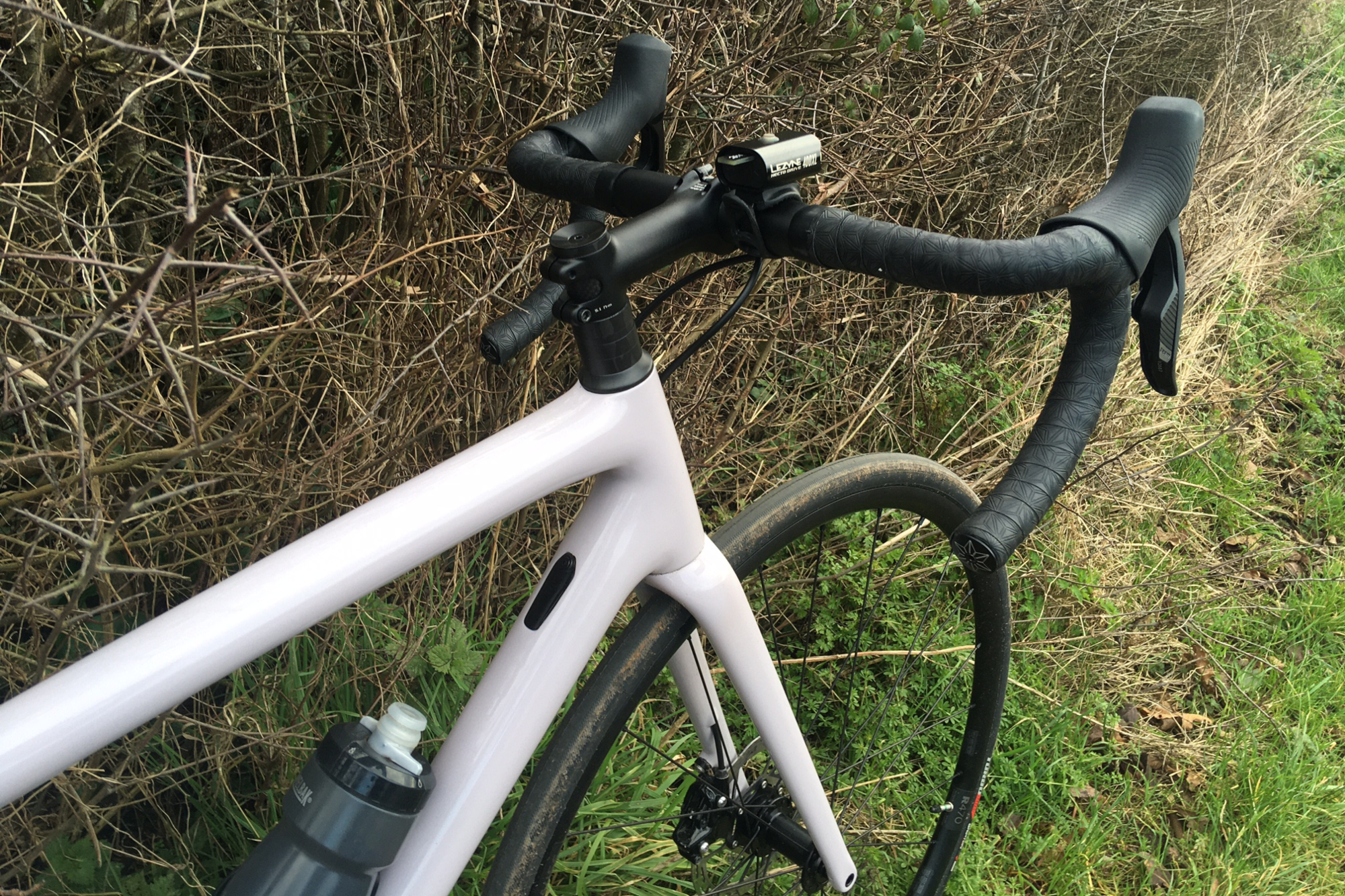
Which of course means that, despite Specialized’s chosen marketing slant, you could happily race aboard the Aethos. In fact, current Tour of Flanders Champion Kasper Asgreen did so during a few mountain stages in the 2021 Tour de France, championing its shock absorbent properties on days when, as a non-climber, he’s not expected to be at the sharp end of the race. Riding the Aethos on Stage 8, which featured three Cat 1 climbs, he finished the stage comfortably in 49th place - 27 minutes down on stage winner Dylan Teuns but less than 10 minutes behind teammate Julian Alaphilippe. So it’s probably safe to say that as a race bike, if you have the legs the Aethos has you covered.
Naturally you’d expect the Aethos to climb well given its superlight frame. And it does. When the road pointed up the only limitations were mine. But even as I tapped up climbs seated the bike felt sprightly. Throw on a set of climbing wheels, hit peak season fitness, and I’d imagine the Aethos would be flying uphill. Perhaps more interesting was how it performed coming down. On descents the liveiness was superseded by a solidity not always associated with light road bikes. It stayed on line beautifully, tracking in and out of corners, and never once felt twitchy at speed.
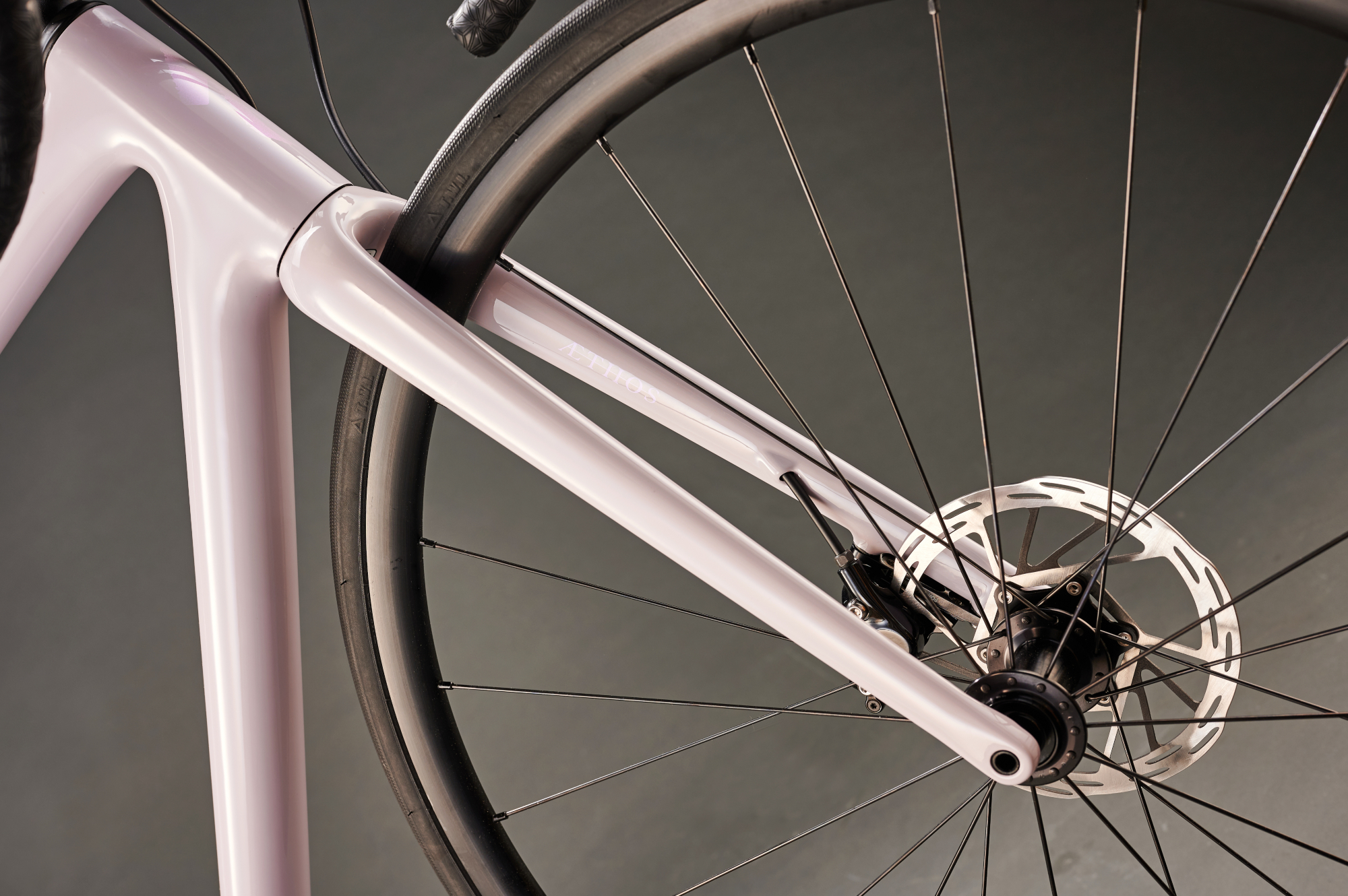
This balance of attributes is, for me, the hallmark of a great bike. And it’s at the heart of the Aethos. There are many modern road bikes that can be exhilarating. There are plenty that will feel like your favorite armchair on an all-day jaunt around the lanes. But often these come at a cost. Without counterbalance an aero-enhanced rocket ship is just fast. Ridden at any other speed than flat out and it loses its functionality and with it some of its appeal. Likewise, a comfy endurance bike is just the ticket until you decide that you want to turn up the gas a little and it can’t respond. The Aethos does it all. What the Specialized engineers have done in pursuit of that ‘ride quality’ is address the needs of bike riders not racers.
The front end was a little lower than I anticipated and I feel that Specialized could have adjusted the stack to provide a greater differential between the Aethos and the Tarmac, but that wish will be rider dependent.
The choice of groupset needs a mention here. SRAM Rival eTap AXS seemed like a great fit for a lower priced Aethos. And it is. It’s a brilliant groupset fitted to any bike; its functionality matches that of Force and Red and the lever hoods, in my mind, are more comfortable than either of these more expensive choices. It’s reliable, intuitive and offers sensible gearing ratios that allow extensive range without big jumps.
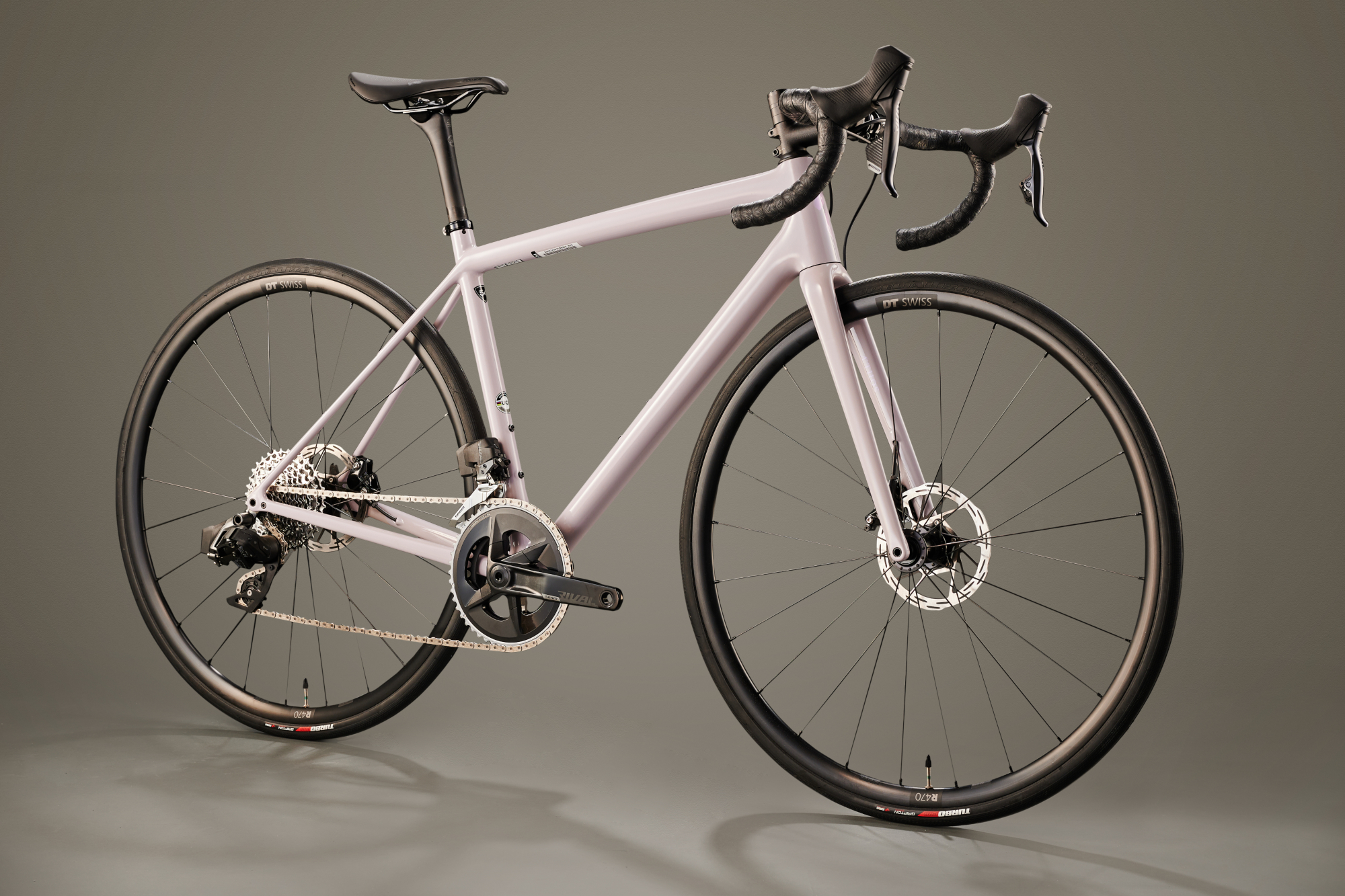
I hope the Aethos ushers in an era of the mainstream brands building really cool road bikes that are designed for a life outside of racing. Bikes that are functional (with threaded bottom brackets and regular bars and stems) without being overtly traditional. Bikes that are quick and agile but not twitchy. And bikes that are comfy, not harsh but yet remain alive and certainly never dull. In essence, bikes we can all enjoy and that are tailored for a broader range of riding and conditions, yet still feel special. Just like the Aethos.
If it sounds like the Aethos is near perfect, it’s not. Well at least not all aspects of the Comp build are. While the frameset is a triumph of engineering, the wheelset is far less considered.
Essentially, my misgivings about the wheels when I unboxed the bike played out on the road. They’re fine I guess but the Aethos isn’t about fine. It’s about ‘ride quality’ remember? And the wheels did their best to suck that ‘quality’ out. That they couldn’t is testimony to the frameset. On a lighter set of hoops with wider tyres, the yin and yang of the Aethos, namely the comfort and the agility, would only be enhanced. But on the less than perfect roads I ride the stock wheels just felt cumbersome and wooden, adding to resistance rather than helping to alleviate it.
Perhaps Specialized have half an eye on Aethos Comp owners upgrading the wheelset anyway? But for a £5,000 bike, that shouldn't be the case.
Value and conclusions
At £5000 / US$5,200 the Aethos Comp equates to a considerable chunk of change. But even among high price tags, value for money is still an important issue. At any spec level the Aethos is clearly built around the frameset, but perhaps even more so here. The wheels are average at best and wouldn’t be out of place on a bike that cost thousands less. The bars and stem, though fine, are again pretty ordinary. I’d hazard a guess that most Aethos Comp owners will be swapping out both the wheels and the cockpit within a few months. At 7.8kgs (54cm) it’s not a heavy bike by any stretch of the imagination but if you’ve chosen it primarily because of its featherweight frameset you’ll probably want to try and drop that number.
A Trek Emonda SL6 with Rival AXS costs £4,300 / US$4,929.99. Here you get a set of carbon hoops in the shape of Bontarger’s Aeolus Elite 35 wheelset. Interestingly a 56cm has a claimed weight of 8.69kg. That’s not far off 1kg heavier than our Aethos Comp, albeit in a larger size frameset. Clearly the low weight of the Aethos frameset is the difference maker here.
Both Giant’s TCR Advanced Pro 1 and Defy Advanced Pro 2 are offered with the Rival AXS groupset. Both use Giant branded carbon wheels on these builds. The TCR has an RRP of £4,399, while the Defy costs £3,599.
Boardman is another brand now offering a Rival AXS spec'd bike in the form of its SLR 9.4 Carbon Disc. It’s equipped with an alloy wheelset - the Alex RX D3 - but still manages to undercut the weight of the Emonda SL6, tipping the scales at 8.1kg. Rather remarkably it can be yours for £2,700, which is quite obviously a huge saving on the Aethos.
The Aethos is, quite simply, a remarkable bike to ride. However, the pricing stands to be a major black mark against its record. It is a bike for the masses - but only the masses prepared (and able) to spend a hefty chunk on the joy of the ride.
Specs
- Frame: FACT 10R Carbon
- Forks: FACT Carbon
- Groupset: SRAM Rival eTap AXS
- Wheels: DT Swiss R470 rim / Specialized hub
- Tyres: Specialized Turbo Pro 700c x 26mm
- Bars: Specialized Shallow Drop, 6061 aluminium
- Stem: Specialized Pro SL, alloy, 4-bolt
- Seatpost: Roval Alpinist Carbon Seatpost
- Saddle: Specialized Body Geometry Power Sport, steel rails
- Weight: 7.86kg (54cm)

Thank you for reading 20 articles this month* Join now for unlimited access
Enjoy your first month for just £1 / $1 / €1
*Read 5 free articles per month without a subscription

Join now for unlimited access
Try first month for just £1 / $1 / €1
Get The Leadout Newsletter
The latest race content, interviews, features, reviews and expert buying guides, direct to your inbox!
Luke Friend has worked as a writer, editor and copywriter for twenty five years. Across books, magazines and websites, he's covered a broad range of topics for a range of clients including Major League Baseball, the National Trust and the NHS. He has an MA in Professional Writing from Falmouth University and is a qualified bicycle mechanic. He has been a cycling enthusiast from an early age, partly due to watching the Tour de France on TV. He's a keen follower of bike racing to this day as well as a regular road and gravel rider.
-
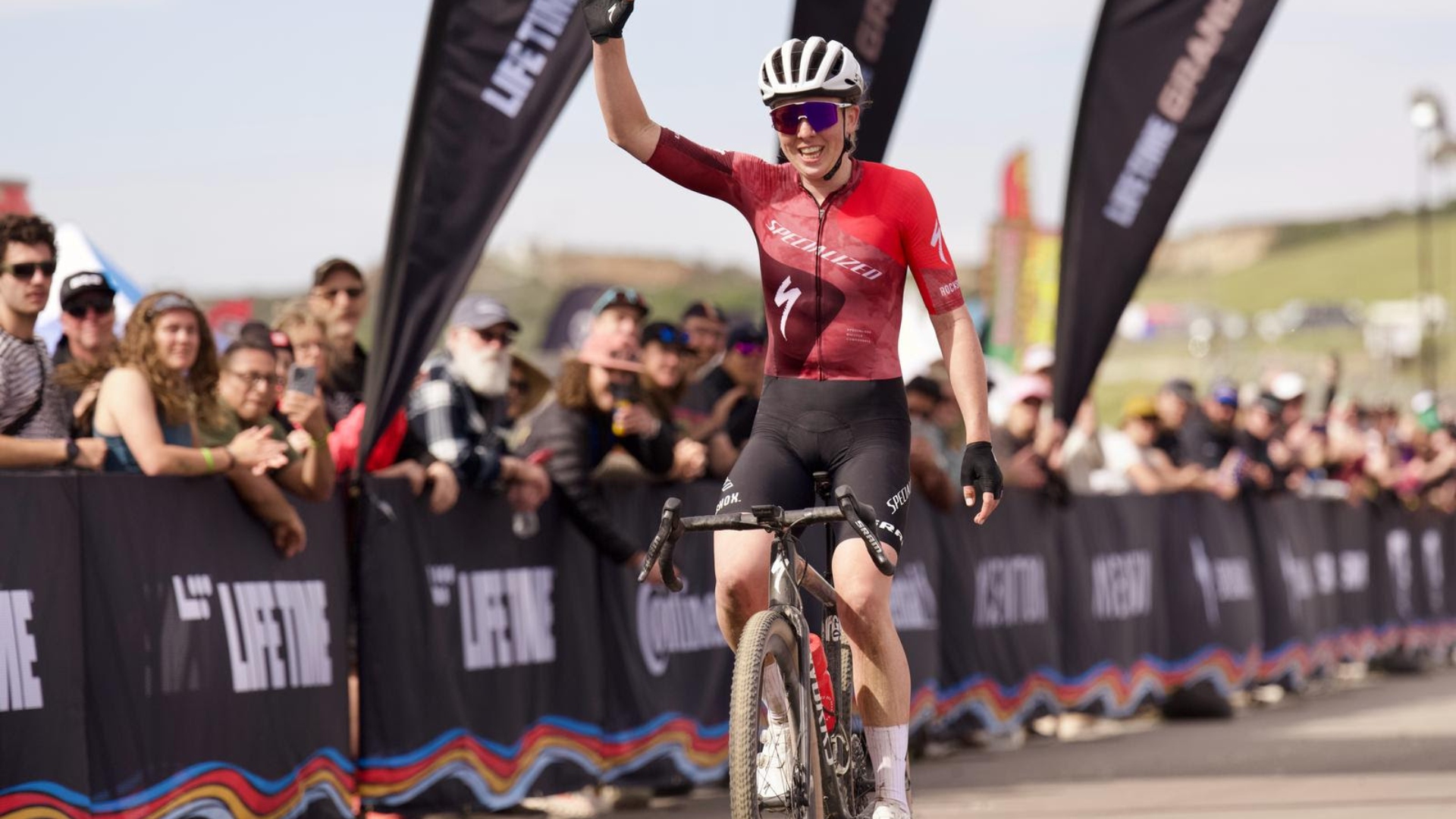 'I gave it everything I had' - Keegan Swenson and Haley Batten win Sea Otter Classic Gravel
'I gave it everything I had' - Keegan Swenson and Haley Batten win Sea Otter Classic GravelOlympic medalist mountain biker Batten crushes her first gravel race; Swenson and Villafane slip into familiar Life Time Grand Prix series leads
By Ryan Simonovich Published
-
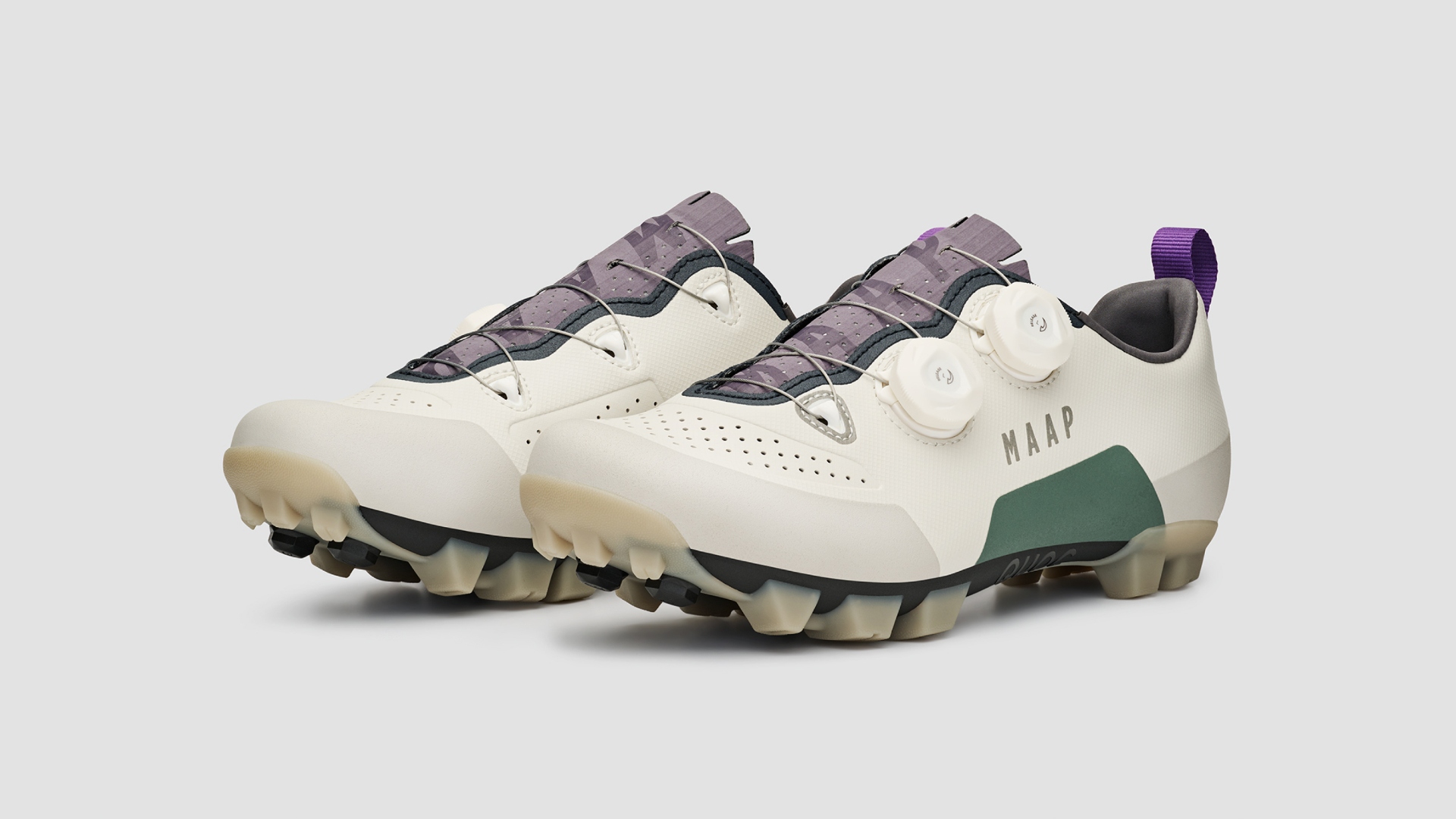 MAAP teams up with QUOC; first collab is the Gran Tourer XC shoe
MAAP teams up with QUOC; first collab is the Gran Tourer XC shoeDesigned for off-road riding the limited-edition shoe features a new colourway and other features
By Luke Friend Published
-
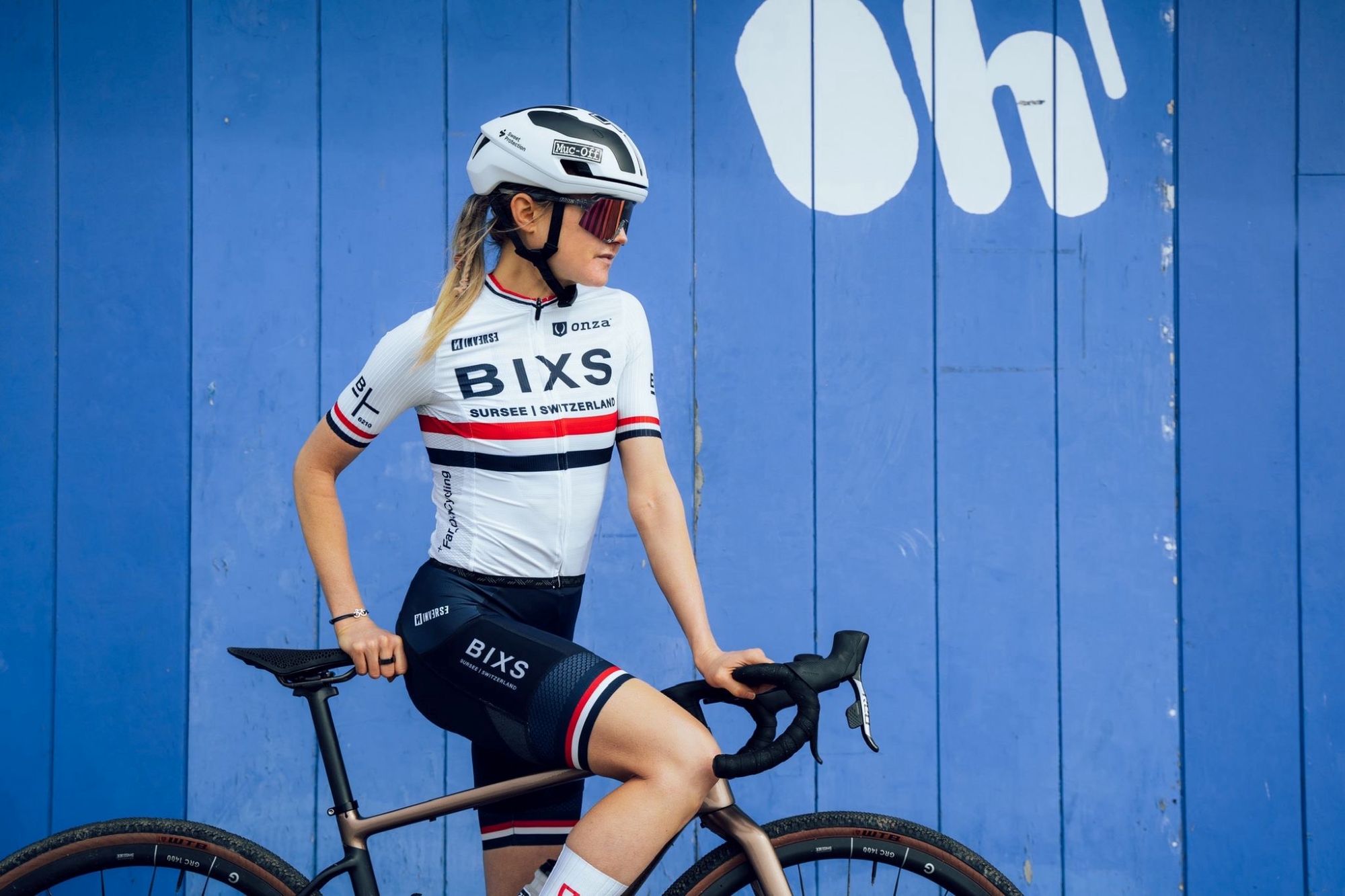 'I may not have a ridden a bike, but I’m f*****g strong' - British gravel racer has unusual off-season ahead of Sea Otter Classic
'I may not have a ridden a bike, but I’m f*****g strong' - British gravel racer has unusual off-season ahead of Sea Otter ClassicAnnabel Fisher tells Cycling Weekly about her ski racing season ahead of returning to gravel
By Tom Thewlis Published